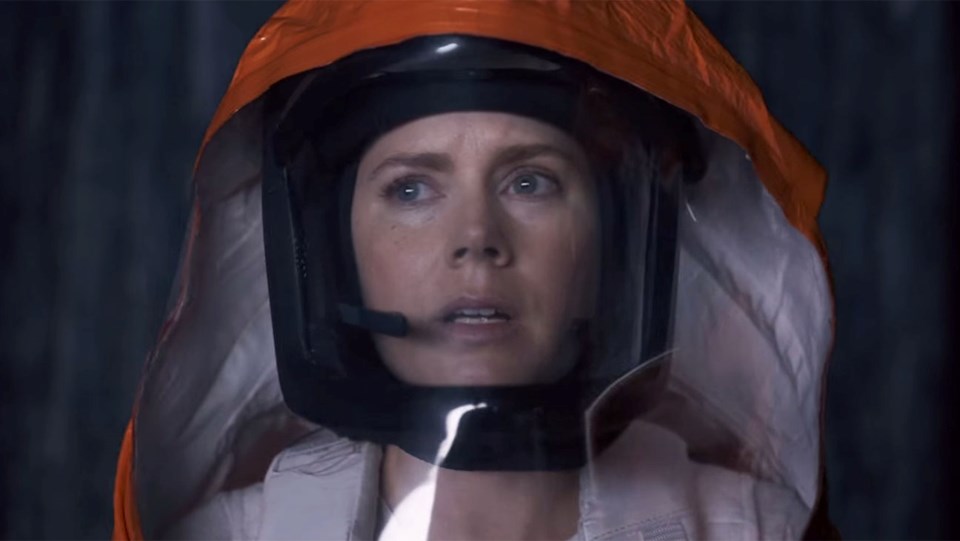Comedian Louis CK was on a talk show last week, excited at the prospect of the first mother in the White House. “A mother,” he said, “feeds you, she protects you, she takes care of s***” in a way that fathers cannot.
It’s motherhood that motivates the lead character in Arrival, infusing her with deep loss and sadness but also emboldening her to remove all protective gear in the face of danger when the tough guys around her could or would not. It takes a woman to strip down to basics in order to try and communicate properly; director Denis Villeneuve chose Amy Adams for the role, and by the film’s end we can imagine no one else expressive enough for the task.
Adams plays Louise Banks, a linguistics professor teaching to a class that is suddenly pelted by ringing cellphones. A student asks her to turn on the news: the planet, it seems, has been invaded. Army helicopters buzz overhead the next day as Louise returns to a deserted campus, where Colonel Weber (Forest Whitaker) suddenly appears with a highly classified recording of the invaders’ various clicks and moans. It’s like nothing she’s heard before, and Louise says she can’t possibly translate unless she was to see the creatures face to face (or face to tentacle, as fate may have it). The government refuses and Louise retreats to her house on the lake, falling asleep and waking to the news that a dozen mammoth elliptical craft have landed — well, hovered — over random sites around the globe.
A military chopper slices the silence, landing on her front lawn and Col. Weber returns, contrite. She’s whisked away to a site in Montana along with theoretical physicist Ian Donnelly (Jeremy Renner), and the two arrive just in time to see the last analyst being carried out on a stretcher. “Not everyone is wired for what you are about to do,” a doc explains.
The gargantuan craft, resembling half of a smoothed, black pebble, hangs vertically and in sharp contrast to the green pastures that surround it. Clouds roll nearby but seem to avoid it. Louise and Ian — and we, the viewers — get up and personal with the space craft and its inhabitants pretty quickly: a small opening in the “ship” only appears every 18 hours, so Louise is on a tight deadline to see if the visitors come in peace or mean to do harm.
It’s an impressive, gravity-defying introduction. The aliens can be seen hovering, dancing in a gauzy white atmosphere behind some kind of glass wall. Over time, and after Louise throws aside that bulky space helmet, she realizes that the tentacle creatures communicate best by inky circles, not unlike coffee stains on a paper napkin.
“How about we just talk to them before we throw math problems at them?” Louise asks, exasperated. But progress is too slow for the other countries where the crafts have landed. When Louise receives a single word, “weapon,” China and Russia panic and cut communication. But the English language is tricky, much less a language-by-ink-blot: does “weapon” really mean “tool”? Are they offering a gift? The real enemy seems to come from within, not from outer space.
The film raises the bigger issues of war and our planet’s divisiveness, and Villeneuve (Sicario, Incendies) creates a time-bending, terrifyingly realistic and immersive experience through otherworldly camera angles and aided by a solemn, moody score from Johan Johansson.
But Adams perfectly portrays both the weighty sadness of loss and quiet wonder of new discovery; so often her reactions beat us to the punch. And as things get more complex, Adams compensates: the more visits she makes to the craft, the more frequently Louise dreams in the aliens’ language and sees images of the daughter she has lost. Again it’s a mother’s place to protect the planet and future generations from boys with their fingers on the triggers.
Rarely has a science-fiction film been this touching. The story begins and ends with the life of Louise’s daughter but “I’m not sure if I believe in beginnings and endings anymore.” And neither will the viewer after their first viewing of Arrival.
Arrival opens today at Scotiabank and Friday at Marine Gateway.



